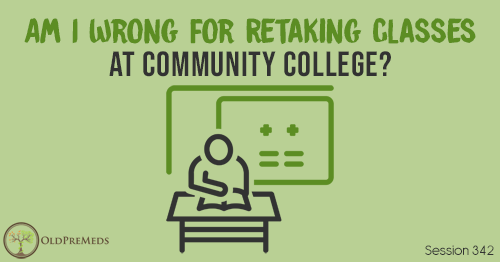Apple Podcasts | Google Podcasts
Session 341
This nontrad is a registered nurse in the Air Force and is looking for the right time to begin their coursework. Is it possible to do while on active duty?
Questions answered here on the podcast are taken directly from premedhangout.com. Go ask your questions there and use #OPMquestion.
Also, please be sure to check out all our other podcasts on Meded Media as we try to bring you as many resources as you need on this journey.
Listen to this podcast episode with the player above, or keep reading for the highlights and takeaway points.
The MCAT Minute
The MCAT Minute is brought to you by Blueprint MCAT. Sign up for a free Blueprint MCAT account to access free resources like half-length and full-length practice exams, a study planner tool, and a flashcard platform to help memorize formulas and amino acids for the MCAT.
OldPreMeds Question of the Week
“I’m currently an active duty officer in the Air Force working in an outpatient clinic as a registered nurse. And I’m wondering if it’s possible to take premed coursework while on active duty? Or should I separate completely, or go to the Guard or Reserves and then take classes?”
Navigating Coursework and Activy Duty
It is possible to take premed prerequisite courses while remaining active duty, provided your job duties allow for it. As a registered nurse in an outpatient clinic with normal daytime hours, you likely have the flexibility in your schedule to sign up for evening or online classes.
“The military owns you basically, but… you also still have typically a lot of flexibility, depending on what your job duties are.”
Challenges of Pursuing Pre-Med Studies with Frequent Deployments or Demanding Job Hours
Many active-duty military members pursuing medical school, their service obligations can make it very difficult to also take on formal coursework. For instance, frequent deployments every 2 months would not allow time to reliably commit to a semester-long class schedule due to all the missed classes, exams, assignments etc.
Additionally, some job duties may require hours that are so hectic and unpredictable that signing up for classes at set times each week would also be infeasible.
Essentially, for those with deployments more often than every few semesters, or jobs with an extremely demanding schedule, it will be very challenging to balance military duties with undergraduate pre-med prerequisites in a timely manner.
The lack of consistency would likely lead to poor performance or inability to complete courses successfully.
Potential for Taking Classes as an Outpatient Clinic Nurse
Working regular daytime hours in an outpatient clinic, like 9-5 or 8-5, provides a more predictable schedule compared to other military jobs involving frequent deployments or irregular hours. This stability in one’s work schedule creates the potential opportunity to pursue part-time undergraduate studies.
A few good options would be to do community college or online classes that could fit within the normal workday of a registered nurse, given the typical demands of such a clinical role. Having evenings and weekends free of work responsibilities opens the door to pursuing prerequisite coursework required for medical school applications.
Option 1
If your schedule is open, I would recommend starting with 1-2 classes at a time at your local community college. This allows you to ease into the coursework and maintain your duties.
Option 2
Another option is separating from active duty, which would grant more freedom but come at the cost of your current pay and benefits.
Option 3
A third path could be transferring to the Reserves or National Guard. This may provide tuition assistance for school as well as keeping your military affiliation. However, you would take on additional training obligations on weekends.
Feasibility Depends on Your Specific Situation
Ultimately, only you can assess if pursuing pre-med courses while serving is realistic given your deployment potential, duty requirements, and other commitments.
And so, first, evaluate your individual circumstances and position in your current military job. Where are you in terms of upcoming deployment rotations or transfers to new bases? Do you anticipate any changes in your duties in the near future?
Taking stock of your specific situation is important for assessing feasibility of adding coursework to your obligations and commitments. If you’re not going to deploy for a while your job hours are pretty standard, and if you’re not going to move anywhere to a new base anytime soon, then consider taking classes.
“There (theoretically) isn’t a problem to be active duty and taking classes.”
Speaking to your supervisor and using any military education benefits wisely can help determine the best path forward for your goals.
The Military’s Preference for Continuing Education Through Affiliated Schools
While the military may want service members to continue their education, they typically prefer for courses to be taken through educational institutions affiliated with each branch, such as Community College for the Air Force.
The military’s goal is for personnel to pursue further training and development. But note that they likely have a preference for classes being done through these military-connected schools as opposed to other outside colleges/universities.
Relevant Science Background but Different Course Requirements
While having a nursing background provides valuable science knowledge, the specific coursework done in nursing programs does not always align with medical school prerequisites.
Many nursing majors take modified science classes tailored for that clinical field, such as “Biochemistry for Nurses” or “Organic Chemistry for Nurses” rather than the standard versions required by medical schools.
These nursing pathway courses, though still rigorous, tend to focus more on direct application of the topics to patient care rather than the foundational content covered in pre-med tracks.
As a result, someone with a nursing degree would still need to complete the traditional prerequisite classes. All med school applicants are expected to have those on their transcript, even if the overall scientific concepts are familiar from prior nursing education.
Weighing All the Options as a Non-Traditional Premed Student
When considering a career shift into medicine later in life, there are countless factors to consider about the best path forward. Each applicant’s situation is unique, requiring self-reflection tailored to one’s individual priorities and commitments.
As an active-duty nurse hoping to attend medical school, this student faces a complex decision with pros and cons to balancing military service with undergraduate studies.
Ultimately, there is no one-size-fits-all answer. Rather than rushing into a choice, the student would benefit from carefully “playing it by ear” – weighing their military obligations, family responsibilities, financial needs, and desired timeline. Check in regularly with yourself and trusted advisors so you can reevaluate changing circumstances over time.
Seeking Application Guidance or Advising?
Check out medicalschoolhq.net/advising for details on how the Medical School Headquarters team of advisors can help with everything from the application process to getting accepted into medical school. Our services include one-on-one advising as well as an Application Academy program to guide students through each step of achieving their goal of medical school acceptance.












